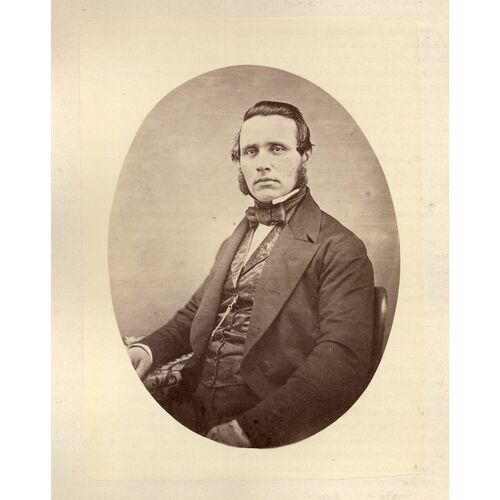RENAUD, LOUIS, merchant and member of the Legislative Council; b. 3 Oct. 1818 at Lachine, near Montreal, L.C., son of Jean-Baptiste Renaud, a voyageur, and Marie-Reine Garriépy; d. 13 Nov 1878 at Sainte-Martine (Châteauguay County), Que.
After a brief primary education, and when he was quite young, Louis Renaud had to work to support his sick father. With his brother Jean-Baptiste, he first became a carter. The two Renauds were still plying their trade, the registers of Notre-Dame de Montréal testify, when they were married at the same wedding service, 18 Jan. 1841. Jean-Baptiste married Sophie Lefebvre, daughter of Jean-Baptiste Lefebvre and Appoline Abraham, and Louis (to whom the registers add the name Paul, which is not found on his baptismal certificate) married Marie-Anne Pigeon, daughter of Félix Pigeon and Véronique-Aimée Trudelle. By the age of 20 Louis had saved up enough to enter business, and at 30 he possessed a sizeable fortune. He went into partnership with his brother Jean-Baptiste, who was later to set himself up at Quebec and establish there the firm of J.-B. Renaud and Company, and exported on a large scale to the English market and to the United States, where their company had agents in most large towns. Around 1856 he became a partner of John Young, an important politician from 1851 to 1872 and one of the most influential businessmen in British North America. The two men engaged in commercial operations that were extensive for the period. Their dealings in England, France, and the United States rivalled those of the largest British and American firms. It is recorded that in certain years they amounted to 20 million “piastres.”
Renaud specialized in the grain trade, and the majority of the merchants in Lower Canada to whom he advanced money and goods became his agents. The master of the grain and flour trade in Lower Canada, he was able to set prices. He was at the height of his career when unfortunate transactions by one of his agents in the United States compromised his credit, and forced him to sell depreciated American shares at a loss. An immense fortune disappeared, but he succeeded in meeting all the demands of his creditors. He lived out his life in moderately easy circumstances at Sainte-Martine, where he owned a great amount of land.
In politics Louis Renaud played a discreet role, which his contemporaries considered important. The Legislative Council of united Canada having become elective, he was returned in 1856 for the division of Salaberry by a majority of 1,200 votes over his adversary, Joseph Doutre*, a lawyer and one of the leaders of the Rouge party. In the autumn of 1864 he was re-elected by acclamation. When in 1867 confederation came into being, he was summoned by royal proclamation to sit in the Senate. The poor state of his health and in particular his failing eyesight forced him to resign in 1873, and he was then replaced by his son-in-law. By his first marriage he had had 11 children; his only daughter, Zoé-Aimée, married Francois-Xavier-Anselme Trudel*, and one of his sons, Napoléon, after serving as a papal Zouave, succeeded him at the head of his business. In March 1864 he married again, his second wife being Hélène Chicoux-Duvert, widow of Charles-Joseph-René Drolet; she survived him. Louis Renaud’s funeral was held at the church of Notre-Dame de Montréal, and the burial took place at Côte-des-Neiges.
At the time of his death La Minerve wrote on 15 November: “He made the name of Canada known to advantage on the English and French markets, through commercial operations that revealed him as a man of exceptional genius.” In 1875, a few years before his death, one of the principal chroniclers of Montreal, the Reverend John Douglas Borthwick, devoted a highly laudatory biography to him, containing these words: “Although his childhood was lacking in any form of instruction, he succeeded, thanks to superior intelligence, indomitable energy, a very strong constitution, and almost superhuman labour, in acquiring knowledge and experience which soon made him a master in the realm of commerce. Few have equalled and perhaps none have surpassed him as far as accuracy in sizing up a situation, speed of conception, and rightness of judgement are concerned.” Throughout his whole career Renaud was a friend of George-Étienne Cartier, whose politics he supported and who used to consult him; Borthwick was thus led to write: “Although he was a man of little culture, his experience, advice, firmness, and energy have often exercised a decisive influence on the politics of his time.”
La Minerve (Montréal), 15 nov. 1878. Borthwick, Montreal, 110. É.-Z. Massicotte, “Deux grands négociants,” BRH, XLII (1936), 339–40.
Cite This Article
J.-C. Bonenfant, “RENAUD, LOUIS,” in Dictionary of Canadian Biography, vol. 10, University of Toronto/Université Laval, 2003–, accessed September 18, 2024, https://www.biographi.ca/en/bio/renaud_louis_10E.html.
The citation above shows the format for footnotes and endnotes according to the Chicago manual of style (16th edition). Information to be used in other citation formats:
| Permalink: | https://www.biographi.ca/en/bio/renaud_louis_10E.html |
| Author of Article: | J.-C. Bonenfant |
| Title of Article: | RENAUD, LOUIS |
| Publication Name: | Dictionary of Canadian Biography, vol. 10 |
| Publisher: | University of Toronto/Université Laval |
| Year of publication: | 1972 |
| Year of revision: | 1972 |
| Access Date: | September 18, 2024 |


![[L'Honorable Louis Renaud] [image fixe] / Studio of Inglis Original title: [L'Honorable Louis Renaud] [image fixe] / Studio of Inglis](/bioimages/w600.4349.jpg)

